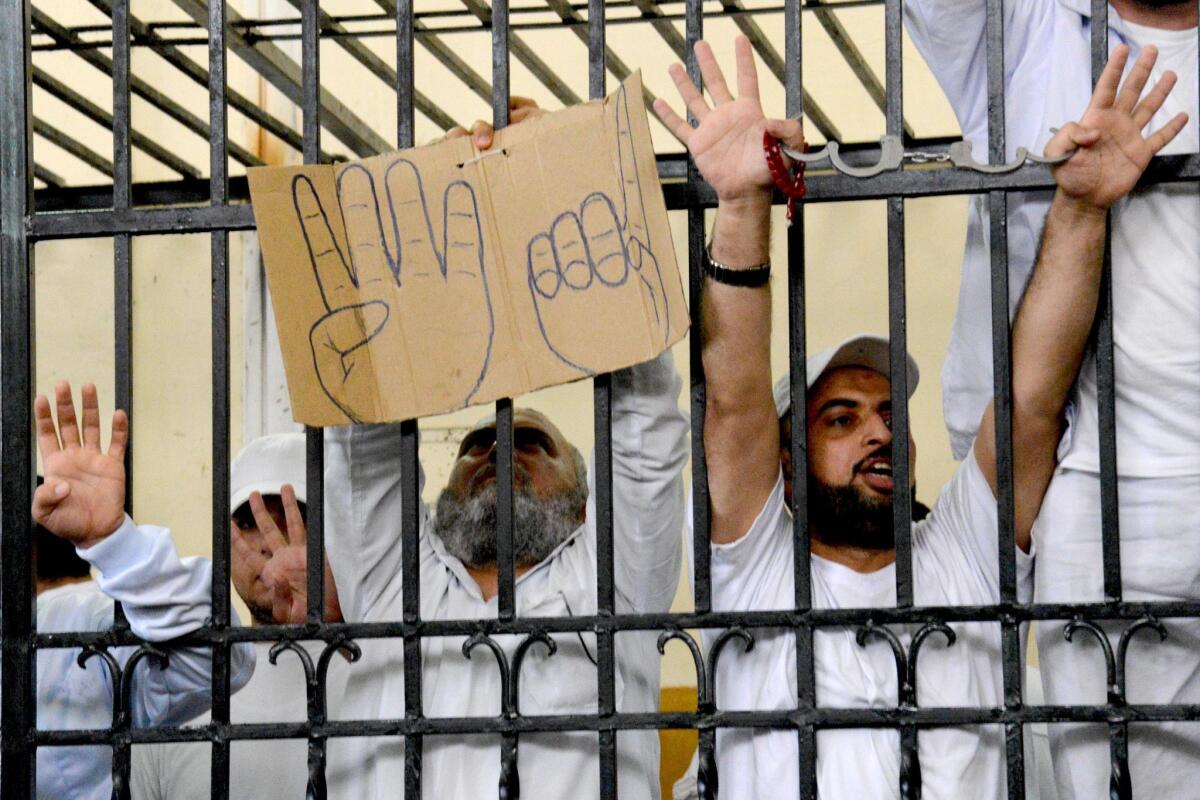Egyptian official denies torture, says prison is like a hotel

- Share via
Reporting from Cairo — Despite widespread and consistent accounts of abuses in Egyptian prisons, a senior Interior Ministry official insisted there was no such maltreatment occurring, and likened jailhouse conditions to a hotel stay.
Egypt’s penal institutions, together with its judiciary system and police force, have emerged as particularly blunt instruments in the government’s crackdown on political dissent. Authorities have mainly targeted supporters of former President Mohamed Morsi and his Muslim Brotherhood, but secular activists have been snagged in the crackdown as well.
The past year has seen an enormous surge in Egypt’s prison population, with thousands jailed under the military-backed interim government that took over after Morsi was removed from office by the army amid mass protests against his rule. The then-defense chief, Abdel Fattah Sisi, was inaugurated this month as president.
In recent months, rights groups have compiled a growing dossier of allegations of detainee maltreatment, ranging from squalid, overcrowded conditions to sexual assault. London-based Amnesty International, in a worldwide report on torture in May, said the practice was “endemic” in Egypt. Egypt’s El Nadeem Center for Rehabilitation of Victims of Violence, also in a report last month, cited systematic abuses taking place in the country’s prisons.
A far more benign counter-narrative was advanced Tuesday night by Gen. Abdel Fattah Osman, who heads the media department at the Interior Ministry. In an interview on the independent satellite channel ONTV, he was asked whether there was any truth to “talk of torture and rape in prisons.”
“This talk is so far from reality and logic,” Osman replied. He said every report of abuse was investigated, and “if anything is proved, we deal with it using our disciplinary code.”
Osman even declared that Egyptian authorities were offering “some form of hospitality” to detainees. “Prisons in Egypt have become like hotels,” he said.
Estimates vary as to the number of people currently incarcerated in Egypt. Officials earlier this year said there had been 16,000 arrests since Morsi was deposed; rights groups believe the actual figure is far higher.
Conditions vary from one prison to another, with some of the harshest treatment — and the greatest impunity for the abusers — reported in military custody. A separate Amnesty International report in May said dozens and perhaps hundreds of civilians had been “disappeared” and held without charge in a prison housed in a military camp northeast of Cairo, where they were subjected to torture in order to make them confess and implicate others.
“They took off my clothes and gave me electric shocks all over my body … including on my testicles, and beat me with batons and military boots,” one detainee told the rights group. “They handcuffed me from behind and hung me on a door … in one interrogation they burned my beard with a lighter.”
El Nadeem’s report, mainly based on the testimony of released prisoners, also suggested that current prison practices were as bad or worse than during the police-state era of longtime autocrat Hosni Mubarak, forced out by a massive 2011 uprising.
“Shocks, beatings, burnings, insults, deprivation and many other tools of torture still do leave their marks on the bodies and souls of detainees, as they did for dozens of years,” the report said. “This is a throwback to some old and horrifying practices.”
It is rare that a day goes by without dissenters being rounded up, often with rough treatment commencing even before they land in jail. On Tuesday, security forces violently broke up a protest by secondary school students calling for the reform of the education system. Photographs that circulated on social media appeared to show uniformed and plainclothes officers beating arrestees.
The government has been making frequent use of an anti-protest law enacted seven months ago that in effect makes street demonstrations illegal. Seven of the students arrested Tuesday were charged under the measure, which has been used to prosecute a number of high-profile activists. Usually other charges are tacked on: in the students’ case, attacking police personnel and blocking traffic.
Hassan is a special correspondent.
For the latest news from Egypt and the Middle East, follow @laurakingLAT
More to Read
Sign up for Essential California
The most important California stories and recommendations in your inbox every morning.
You may occasionally receive promotional content from the Los Angeles Times.













